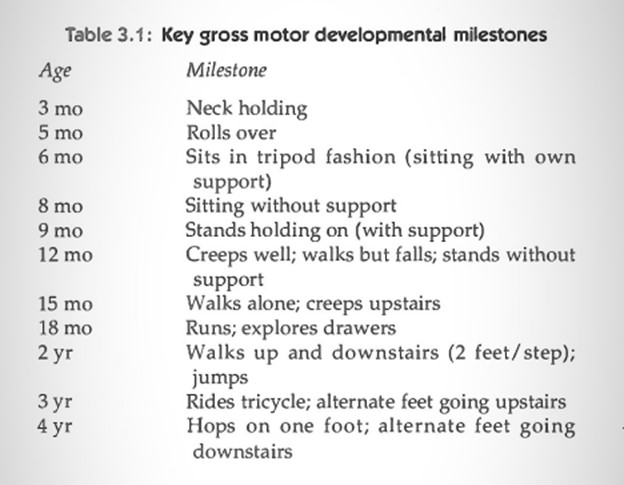A nurse is assessing a female child in an area struck by an earthquake. The child, who is crying, walks well, can state her first name, and repeatedly says "All done" and "Go bye-bye” now during the assessment. The child has 24 deciduous teeth and her anterior fontanel is closed. Based on these observations, the nurse should estimate that the child is how many months old?
24
12
18
30
The Correct Answer is D
Walking Well: The ability to walk well typically develops around 12 to 15 months. Since the child walks well, we can consider her closer to this age range.
Stating first name: By 24-30 months, most children can identify themselves by name.
Repeating Phrases (“All done” and “Go bye-bye”): Repeating phrases is common around 15 to 18 months. The child’s language development aligns with this stage.
24 Deciduous Teeth: By the age of 2 to 3 years, children typically have all 20 deciduous (baby) teeth. Since this child has 24 deciduous teeth, she is likely closer to the 2-year-old mark.
Closed Anterior Fontanel: The anterior fontanel (soft spot on the baby’s head) usually closes by 18 months. The fact that it is closed indicates that the child is beyond this age.
Child is most likely 30 months old.
Nursing Test Bank
Naxlex Comprehensive Predictor Exams
Related Questions
Correct Answer is C
Explanation
By 15 months of age, toddlers typically develop the ability to stand and maintain balance without support. This milestone is an important indicator of gross motor development. Not being able to stand upright without support at this age may suggest a delay or impairment in motor skills, and further evaluation may be needed to determine the underlying cause.
The other findings mentioned—difficulty jumping with both feet, inability to build a tower of six to seven cubes, and inability to turn a doorknob—are within the expected range of development for a 15-month-old toddler. While some children may already demonstrate these skills, others may acquire them later in their developmental journey. It is important to consider individual variations in development, but the inability to stand without support should be further assessed.

Correct Answer is C
Explanation
It is important to recognize that picky eating is a common behavior among preschool-age children and may be a normal part of their development. Children at this age often exhibit preferences for certain foods and may be resistant to trying new foods or eating a wide variety of foods. It is important for parents to understand that this behavior is generally temporary and will likely improve over time.
The nurse should reassure the mother that it is normal for young children to have fluctuations in their appetite and food preferences. Encouraging a positive mealtime environment and offering a variety of healthy foods is important, but pressuring or forcing the child to eat can lead to negative associations with food and mealtime.
Emphasizing the quantity of food consumed over the quality is not recommended, as it may promote unhealthy eating habits. It is important to prioritize offering a balanced diet with a variety of nutrient-rich foods.
Adding fruit juice to the child's diet to increase vitamin intake is not recommended as the primary strategy. Fruit juice is often high in sugar and low in fiber, and excessive consumption can contribute to poor eating habits and dental caries. It is better to focus on offering whole fruits and vegetables for their nutritional benefits.
Having the child remain at the table after meals to increase food intake is not recommended either. It is important to respect the child's appetite and avoid creating negative associations with mealtime. Forcing a child to stay at the table can increase mealtime stress and may further reinforce picky eating behaviors.
Overall, the nurse should provide reassurance to the mother, promote a positive mealtime environment, offer a variety of healthy foods, and allow the child to regulate their own food intake.
Whether you are a student looking to ace your exams or a practicing nurse seeking to enhance your expertise , our nursing education contents will empower you with the confidence and competence to make a difference in the lives of patients and become a respected leader in the healthcare field.
Visit Naxlex, invest in your future and unlock endless possibilities with our unparalleled nursing education contents today
Report Wrong Answer on the Current Question
Do you disagree with the answer? If yes, what is your expected answer? Explain.
Kindly be descriptive with the issue you are facing.
